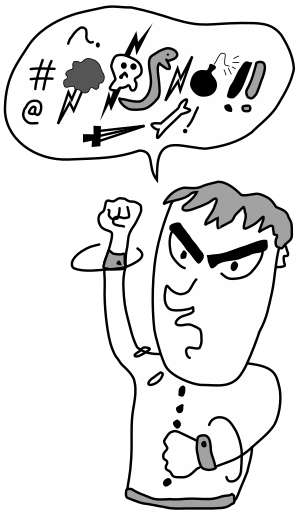Profanity facts for kids

Profanity, also known as cursing, cussing, swearing, bad language, foul language, obscenities, expletives or vulgarism, is a socially offensive use of language. Accordingly, profanity is language use that is sometimes deemed impolite, rude, or culturally offensive; in certain religions, it constitutes sin. It can show a debasement of someone or something, or be considered an expression of strong feeling towards something. Some words may also be used as intensifiers.
In its older, more literal sense, "profanity" refers to a lack of respect for things that are held to be sacred, which implies anything inspiring or deserving of reverence, as well as behaviour showing similar disrespect or causing religious offense.
Contents
Etymology
The term profane originates from classical Latin profanus, literally "before (outside) the temple", pro meaning 'outside' and fanum meaning 'temple' or 'sanctuary'. The term profane carried the meaning of either "desecrating what is holy" or "with a secular purpose" as early as the 1450s. Profanity represented secular indifference to religion or religious figures, while blasphemy was a more offensive attack on religion and religious figures, considered sinful, and a direct violation of The Ten Commandments in the majority-Christian Western world. Moreover, many Bible verses speak against swearing. In some countries, profanity words often have pagan roots that after Christian influence were turned from names of deities and spirits to profanity and used as such, like famous Finnish profanity word perkele, which was believed to be an original name of the thunder god Ukko, the chief god of the Finnish pagan pantheon.
Profanities, in the original meaning of blasphemous profanity, are part of the ancient tradition of the comic cults which laughed and scoffed at the deity or deities: an example of this would be Lucian's Dialogues of the Gods satire.
History
Words currently considered curse words or profanity were common parlance in medieval English. In the Elizabethan era, some playwrights, like Shakespeare, largely avoided direct use of these words, but others, like Ben Jonson, did use them in his plays.
Slurs vs. profanity
Profanity is widely considered socially offensive and strongly impolite; slurs, however, are both intended to be and by definition are derogatory, as they are meant to harm another individual. Although profanity has been seen to improve performance or relieve anxiety and anger, and can be used in a lighthearted way, this effect and impact cannot be observed with slurs. Though slurs are considered profanity by definition, being both socially offensive and strongly impolite, profanity can be used in a non-targeted manner where slurs cannot.
See also
 In Spanish: Lenguaje soez para niños
In Spanish: Lenguaje soez para niños

